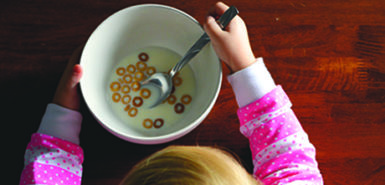
Virtual school. Canceled activities. A glut of screen time. Disrupted routines.
These are just a few of the challenges children and teens have faced in the last year.
So it’s little surprise that childhood obesity—an epidemic before the pandemic—has only gotten worse.
Much as the pandemic has contributed to weight gain for some adults, it has done the same for many children.
“Anything that disrupts people’s lifestyle presents a challenge to committing to healthy habits,” Spectrum Health pediatrician William Stratbucker, MD, said.
Before the pandemic, those disruptions included events such as illness or death in the family, or parents changing jobs or getting divorced.
The pandemic has led to disruption in everyone’s life, Dr. Stratbucker said.
“It’s been challenging for many families to adhere to any healthy habits that they had and to keep them going,” he said. “Adopting new healthy habits has not been the top priority for many.”
There are various reasons for this, including increased stress in families, challenges in accessing food (particularly healthy food), canceled organized sports, job loss and financial struggles, according to Dr. Stratbucker.
On the flip side, there have been some positives for families, he said.
Some families have had more time together. And some are eating in more than eating out, which could lead to healthier habits.
Others have also had more time to invest in habits such as healthy meal preparation and exercise, because they are not commuting to work or running to various activities.
“The bottom line is that there is a reason that we as medical professionals want to help people manage their weight and avoid excessive weight gain, because there are consequences that can start at very young ages,” Dr. Stratbucker said. “We want to help kids grow in healthy ways.”
Dr. Stratbucker offered tips for starting healthy habits at home and staying on track:
Be food smart
Be wise about the types of food and drinks you bring into the house—and be aware of your kids’ access to them.
“One of the benefits of being in school is that you’re not around food for several hours in the day, so there isn’t that access to eating,” Dr. Stratbucker said. “That’s definitely been a problem for some kids with too easy access to food when they don’t need it.”
He suggests planning regular family meals and being aware of your kids’ snacking habits.
For instance, kids should not need to eat at night after a healthy dinner, he said.
If Dr. Stratbucker could eliminate one thing from every home? Sugary drinks such as pop, juice and sports drinks.
So take a look at your kitchen and pantry areas. You might need to think about what you’re bringing into the house and where you’re storing it.
Stay active
Help your kids find ways to be active.
“There has been a drastic decrease in the number of activities that are available,” he said. “We have to find the opportunities and, if they’re not there, we have to find ways to be active.”
That might mean turning to unstructured activities like playing outside in the yard, going places where it’s safe to exercise and taking advantage of online resources.
Set schedules
Set a meal schedule and sleep schedule for your kids.
A major contributor to childhood obesity is lack of healthy sleep habits, according to Dr. Stratbucker.
It’s important to go to bed at a proper hour and wake up at a reasonable hour.
When kids don’t have to get up and out of the house for school, they may be more likely to sleep in past late morning or beyond.
And when they have access to electronics at bed time, it can lead them to stay up late.
Anxiety about the pandemic and other issues can also rob kids of sleep.
“This is a dramatic problem for some kids,” Dr. Stratbucker said. “It creates a cascading effect of issues with extra hunger and lower energy.”
He sees the problem whenever kids are out of school, including in the summer.
“If you orient your day-to-day lifestyle around a healthy sleep cycle for your kids, that’s going to be a good place to start,” he said. “Getting the right amount of sleep helps mood and hunger.
“Of course, if you’re sleeping regularly at healthy hours, you’re not going to be eating at times when you shouldn’t.”
Nurture healthy minds
Be aware of mental health struggles your kids might be facing—and help them get help when needed.
The pandemic has caused a variety of mental health concerns with kids, Dr. Stratbucker said. These mental health struggles can contribute to unhealthy eating and bad sleeping habits.
The good news? Clinicians are in tune with the mental health crisis facing kids—and they’re eager to connect them with the help they need, he said.
Dr. Stratbucker hopes that by keeping these guidelines in mind, families can stay on track, despite the many challenges presented by the pandemic.
“If we have goals of being healthy, then we have to work through whatever challenges life presents,” he said. “Oftentimes people are on a journey to try to be healthy and they get derailed for whatever reason.
“We need to be able to recognize when we’re off track and find ways to get back on track.”
Parents in need of help should reach out to a medical professional—their family doctor or a pediatrician.
“Even when it seems like there are not very many people who may be looking out for you, that is the job and the passion of people who are in positions to promote child health,” Dr. Stratbucker said.
 /a>
/a>
 /a>
/a>
 /a>
/a>